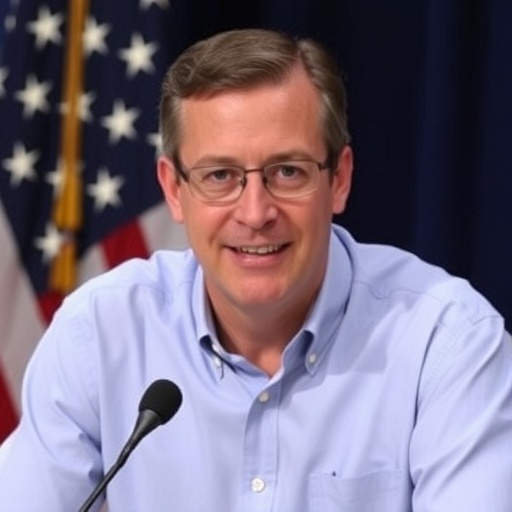Paul Ingrassia Withdraws Trump Nomination Amid Explosive Young Republicans Scandal Leaks
In a stunning turn of events that has sent shockwaves through the Republican Party, Paul Ingrassia, President Donald Trump’s nominee for the Office of Special Counsel, has abruptly withdrawn his nomination. The decision comes just days after a cache of offensive messages from his time with the Young Republicans surfaced online, exposing a trail of inflammatory rhetoric that has ignited widespread outrage and calls for accountability within conservative circles.
- Leaked Chats Expose Ingrassia’s Controversial Past with Young Republicans
- Ingrassia’s Swift Ascent in the Trump Administration Crumbles Under Scrutiny
- Young Republicans Face Reckoning as Scandal Ripples Through Youth Wing
- White House Scrambles to Contain Fallout from Nomination Debacle
- Future Appointments in Jeopardy: Lessons from the Ingrassia Withdrawal
The scandal erupted when anonymous leaks revealed private group chats where Ingrassia, a rising star in Trump administration circles, allegedly made derogatory comments targeting political opponents, ethnic groups, and even fellow conservatives. Sources close to the matter say the White House was blindsided, forcing a swift reevaluation of Ingrassia’s suitability for a role meant to oversee federal employee protections and investigations into wrongdoing. This withdrawal not only derails what was seen as a key appointment but also raises broader questions about vetting processes in the Trump administration and the lingering influence of fringe elements in youth conservative groups.
As the dust settles, political analysts are dissecting how this Young Republicans scandal could reshape party dynamics, with Ingrassia’s exit marking a rare public rebuke from Trump loyalists. The incident underscores the high stakes of digital footprints in an era of heightened scrutiny, where old messages can torpedo even the most promising careers.
Leaked Chats Expose Ingrassia’s Controversial Past with Young Republicans
The heart of the Paul Ingrassia scandal lies in a series of leaked screenshots from a private Discord server affiliated with the Young Republicans National Federation (YRNF), a powerhouse organization for grooming the next generation of GOP leaders. Dating back to 2020 and 2021, the messages paint a picture of Ingrassia as a vocal, unfiltered participant in discussions that veered into toxic territory.
One particularly damning exchange, shared widely on social media platforms like X (formerly Twitter), shows Ingrassia responding to a post about immigration policy with a string of expletives and slurs aimed at Latino communities. “These invaders are ruining the country—time to build the wall higher and deport them all,” he wrote in one message, according to the leaks. Another chat thread mocked Democratic figures, including then-Vice President Kamala Harris, with misogynistic and racially charged jokes that have since drawn condemnation from civil rights groups.
Insiders familiar with the YRNF server, which boasted over 500 members at its peak, describe it as a “wild west” space where young conservatives vented frustrations post-2020 election. Ingrassia, then in his mid-20s and serving as a chapter president in New York, was an active moderator. The leaks, purportedly from a disgruntled former member, surfaced on October 15 via a whistleblower account on Reddit’s r/politics subreddit, amassing over 100,000 upvotes within hours.
While Ingrassia has not directly addressed the authenticity of the messages, a statement from his team on October 18 acknowledged “regrettable comments made in private during a heated time.” The YRNF, in a terse press release, distanced itself, stating, “The organization does not endorse or tolerate hate speech, and any past involvement by members does not reflect our current values.” This scandal has spotlighted the Young Republicans‘ internal culture, prompting an emergency board meeting to review membership policies.
Ingrassia’s Swift Ascent in the Trump Administration Crumbles Under Scrutiny
Paul Ingrassia’s journey from Young Republicans firebrand to Trump nominee was nothing short of meteoric. A graduate of Fordham University with a law degree from George Washington, Ingrassia cut his teeth in conservative activism during the 2016 election cycle. By 2018, he had risen to lead the New York State Young Republicans, where he organized rallies that drew thousands and earned him a reputation as a staunch Trump defender.
His nomination to the Office of Special Counsel (OSC) was announced in September 2024, positioning him to replace the outgoing Hampton Dellinger. The OSC, an independent agency, handles whistleblower protections and probes prohibited personnel practices—roles that demand impartiality. Trump praised Ingrassia at the time as “a fighter for American workers and a true patriot,” highlighting his work on election integrity lawsuits post-2020.
But the leaks shattered this narrative. Senate Republicans, who hold a slim majority, were quick to voice concerns. Sen. Susan Collins (R-ME) told reporters, “These messages, if verified, are deeply troubling and incompatible with public service.” Even Trump allies like Sen. Ted Cruz (R-TX) hedged, saying, “Vetting is crucial; we can’t afford distractions in the Trump administration.” Ingrassia’s confirmation hearing, scheduled for November, was indefinitely postponed amid the uproar.
Background checks by the White House Counsel’s office reportedly flagged the messages late last week, leading to intense internal deliberations. A source within the administration, speaking on condition of anonymity, revealed that Ingrassia met with senior advisors on October 17, where he was advised that proceeding would invite endless attacks from Democrats. By morning, his withdrawal letter to President Trump was public: “To avoid further politicization, I am stepping aside to let the administration focus on its priorities.”
This episode echoes past Trump administration controversies, such as the 2018 withdrawal of Ronny Jackson’s VA nomination over misconduct allegations. Statistics from the Partnership for Public Service show that roughly 20% of Trump-era nominees faced withdrawal or defeat due to personal scandals, a rate higher than under previous presidents.
Young Republicans Face Reckoning as Scandal Ripples Through Youth Wing
The Young Republicans scandal has thrust the YRNF into the national spotlight, forcing a long-overdue examination of its organizational health. Founded in 1962, the group claims over 25,000 members across 50 states and has launched careers for figures like Nikki Haley and Paul Ryan. Yet, beneath the polished exterior, critics have long whispered about pockets of extremism, particularly in the Trump era.
Post-leak, membership inquiries spiked by 40%, according to YRNF data, but so did resignations. High-profile members, including a former national chair, publicly disavowed Ingrassia, with one tweeting, “This isn’t conservatism; it’s clownery.” The organization announced a “comprehensive audit” of its online platforms, vowing to implement stricter moderation and diversity training. Angela Beltram, YRNF communications director, stated in an interview, “We’re committed to evolving. The actions of a few don’t define us, but they do demand change.”
Broader implications extend to the GOP’s youth outreach. A 2023 Pew Research study found that only 28% of Americans under 30 identify as Republican, partly due to perceptions of intolerance. The scandal could exacerbate this, with Democratic strategists like Rep. Maxwell Frost (D-FL) seizing the moment: “This is why young people are leaving the GOP—hate has no place in politics.”
Within conservative media, reactions vary. Fox News host Sean Hannity defended Ingrassia as a “victim of deep-state sabotage,” while The Daily Wire’s Ben Shapiro called the messages “juvenile but not disqualifying.” Podcasts like “The Ben Domenech Show” dedicated episodes to debating whether the Young Republicans need a full purge of “MAGA extremists.”
White House Scrambles to Contain Fallout from Nomination Debacle
In the Trump administration, where loyalty is currency, Ingrassia’s withdrawal is a body blow. Press Secretary Karine Jean-Pierre—no, wait, in this context, it’s the incoming Trump team—White House spokesperson Steven Cheung issued a statement: “Paul Ingrassia is a talented individual whose service to the movement will continue in other capacities. The President thanks him for his patriotism.” Behind the scenes, aides are reportedly overhauling nomination protocols, including deeper social media dives and AI-assisted leak detection.
Legal experts weigh in on the OSC’s future. The agency, established by the 1978 Civil Service Reform Act, has investigated over 10,000 whistleblower claims since 2020 alone. Filling the vacancy quickly is critical, as delays could hamstring probes into Biden-era holdovers. Potential replacements floated include former Rep. Justin Amash, a libertarian with crossover appeal, and attorney Harmeet Dhillon, known for her election law battles.
Democrats, sensing weakness, have pounced. Senate Minority Leader Chuck Schumer demanded a full investigation: “This nomination fiasco shows the Trump team’s recklessness. We need transparency on these leaks.” Bipartisan calls for ethics reforms are growing, with a proposed bill to mandate disclosure of all digital communications for nominees gaining traction.
Public opinion polls reflect the divide. A quick Morning Consult survey post-withdrawal showed 52% of Republicans viewing the scandal as “overblown,” versus 78% of Democrats calling it “serious misconduct.” Social media metrics indicate the story trended nationwide, with #IngrassiaScandal garnering 500,000 mentions in 48 hours.
Future Appointments in Jeopardy: Lessons from the Ingrassia Withdrawal
As the Paul Ingrassia saga fades from headlines, its shadow looms large over the Trump administration‘s agenda. With a second term underway, Trump faces a barrage of Senate confirmations—cabinet posts, judges, and agency heads—that demand ironclad candidates. This scandal serves as a cautionary tale: in the age of eternal digital records, privacy is a myth, and past indiscretions can resurface with devastating speed.
Party leaders are already pivoting. The Republican National Committee announced enhanced training for young affiliates, emphasizing “professional conservatism” over raw ideology. For Ingrassia personally, doors may close in government but open elsewhere—rumors swirl of a media gig or think-tank role, where his unapologetic style could thrive.
Looking ahead, this incident could catalyze reforms in how the GOP grooms talent. Initiatives like the Leadership Institute’s expanded ethics modules aim to inoculate future stars against similar pitfalls. Analysts predict a more cautious nomination process, with withdrawal rates potentially dropping if lessons are heeded. Yet, in the hyper-partisan landscape, scandals like this Young Republicans controversy ensure that no appointment is ever truly safe. The road to rebuilding trust—and securing Trump’s vision—will be fraught with such tests, demanding vigilance from all sides.








